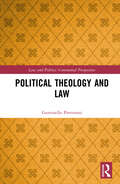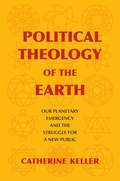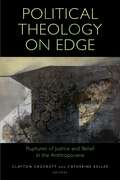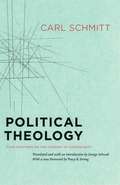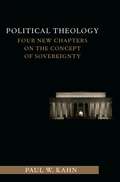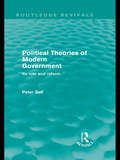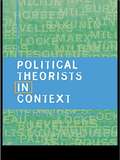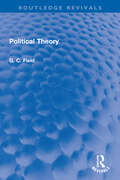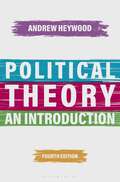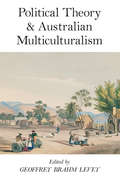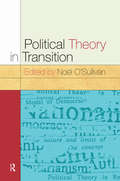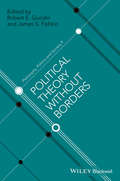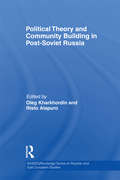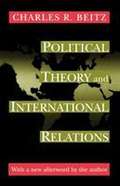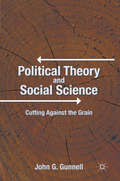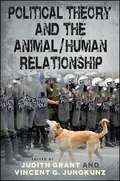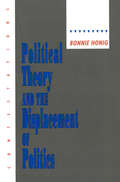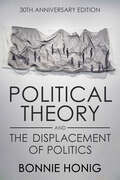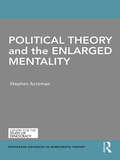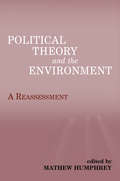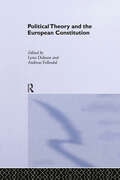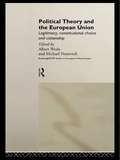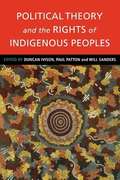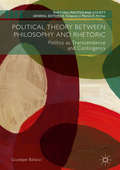- Table View
- List View
Political Theology and Law (Law and Politics)
by Geminello PreterossiThis book addresses two main questions. Can political theology be overcome? And, is what today – in referring to neoliberalism and its genealogy – many define as "economic theology" truly an alternative to political theology, as Foucault has claimed and as Agamben does today? As a first step, the book addresses and clarifies various misunderstandings about the notion of political theology, in its multiple and even opposite meanings. It then focuses on a conceptualisation inaugurated by Carl Schmitt, which sees political theology as the eloquent matrix of modern politics: insofar as the latter produces and continuously re-elaborates an "excess" that does not belong to it, its core remains theological-political, although secularised. The bulk of the book then pursues a reading of the analogic connection between juridico-political concepts and theological-metaphysical concepts; arguing that, although the ‘turn’ to economic theology is indeed another form of political theology, it is a deeply anti-political one, which forecloses modes of resistance. The book will be of interest to scholars, researchers and advanced students in the fields of modern political and legal philosophy and those researching the crisis of its legacy. In particular, it is addressed to those who study the relationship between theology (and its substitutes, such as hegemony and political myth) and politics, power and law, legitimacy and legality, in the perspective of secularization. In addition, the book offers a contribution to contemporary critical studies on the neoliberal state and the return of the "state of exception" in democracies, as well as a questioning of the moralization of law, which is an effect of globalist ideology and the "humanitarian turn" after 1989.
Political Theology of the Earth: Our Planetary Emergency and the Struggle for a New Public (Insurrections: Critical Studies in Religion, Politics, and Culture)
by Catherine KellerAmid melting glaciers, rising waters, and spreading droughts, Earth has ceased to tolerate our pretense of mastery over it. But how can we confront climate change when political crises keep exploding in the present? Noted ecotheologian and feminist philosopher of religion Catherine Keller reads the feedback loop of political and ecological depredation as secularized apocalypse. Carl Schmitt’s political theology of the sovereign exception sheds light on present ideological warfare; racial, ethnic, economic, and sexual conflict; and hubristic anthropocentrism. If the politics of exceptionalism are theological in origin, she asks, should we not enlist the world’s religious communities as part of the resistance?Keller calls for dissolving the opposition between the religious and the secular in favor of a broad planetary movement for social and ecological justice. When we are confronted by populist, authoritarian right wings founded on white male Christian supremacism, we can counter with a messianically charged, often unspoken theology of the now-moment, calling for a complex new public. Such a political theology of the earth activates the world’s entangled populations, joined in solidarity and committed to revolutionary solutions to the entwined crises of the Anthropocene.
Political Theology on Edge: Ruptures of Justice and Belief in the Anthropocene (Transdisciplinary Theological Colloquia)
by Clayton Crockett and Catherine KellerIn Political Theology on Edge, the discourse of political theology is seen as situated on an edge—that is, on the edge of a world that is grappling with global warming, a brutal form of neoliberal capitalism, protests against racism and police brutality, and the COVID-19 pandemic. This edge is also a form of eschatology that forces us to imagine new ways of being religious and political in our cohabitation of a fragile and shared planet. Each of the essays in this volume attends to how climate change and our ecological crises intersect and interact with more traditional themes of political theology.While the tradition of political theology is often associated with philosophical responses to the work of Carl Schmitt—and the critical attempts to disengage religion from his rightwing politics—the contributors to this volume are informed by Schmitt but not limited to his perspectives. They engage and transform political theology from the standpoint of climate change, the politics of race, and non-Christian political theologies including Islam and Sikhism. Important themes include the Anthropocene, ecology, capitalism, sovereignty, Black Lives Matter, affect theory, continental philosophy, destruction, and suicide. This book features world renowned scholars and emerging voices that together open up the tradition of political theology to new ideas and new ways of thinking.Contributors: Gil Anidjar, Balbinder Singh Bhogal, J. Kameron Carter, William E. Connolly, Kelly Brown Douglas, Seth Gaiters, Lisa Gasson-Gardner, Winfred Goodwin, Lawrence Hillis, Mehmet Karabela, Michael Northcott, Austin Roberts, Noëlle Vahanian, Larry L. Welborn
Political Theology: Four Chapters on the Concept of Sovereignty
by Carl SchmittWritten in the intense political and intellectual tumult of the early years of the Weimar Republic, Political Theology develops the distinctive theory of sovereignty that made Carl Schmitt one of the most significant and controversial political theorists of the twentieth century. Focusing on the relationships among political leadership, the norms of the legal order, and the state of political emergency, Schmitt argues in Political Theology that legal order ultimately rests upon the decisions of the sovereign. According to Schmitt, only the sovereign can meet the needs of an "exceptional" time and transcend legal order so that order can then be reestablished. Convinced that the state is governed by the ever-present possibility of conflict, Schmitt theorizes that the state exists only to maintain its integrity in order to ensure order and stability. Suggesting that all concepts of modern political thought are secularized theological concepts, Schmitt concludes Political Theology with a critique of liberalism and its attempt to depoliticize political thought by avoiding fundamental political decisions.
Political Theology: Four New Chapters on the Concept of Sovereignty (Columbia Studies in Political Thought / Political History)
by Paul KahnIn this strikingly original work, Paul W. Kahn rethinks the meaning of political theology. In a text innovative in both form and substance, he describes an American political theology as a secular inquiry into ultimate meanings sustaining our faith in the popular sovereign. Kahn works out his view through an engagement with Carl Schmitt's 1922 classic, Political Theology: Four Chapters on the Concept of Sovereignty. He forces an engagement with Schmitt's four chapters, offering a new version of each that is responsive to the American political imaginary. The result is a contemporary political theology. As in Schmitt's work, sovereignty remains central, yet Kahn shows how popular sovereignty creates an ethos of sacrifice in the modern state. Turning to law, Kahn demonstrates how the line between exception and judicial decision is not as sharp as Schmitt led us to believe. He reminds readers that American political life begins with the revolutionary willingness to sacrifice and that both sacrifice and law continue to ground the American political imagination. Kahn offers a political theology that has at its center the practice of freedom realized in political decisions, legal judgments, and finally in philosophical inquiry itself.
Political Theories of Modern Government: Its Role and Reform (Routledge Revivals)
by Peter SelfThis reissued work, originally published in 1985, is a uniquely broad and original survey of theories and beliefs about the growth, behaviour, performance and reform of the governments of modern Western democracies. After analysing the external pressures which have shaped modern governments, the author examines four different schools of political thought which seek to explain the behaviour and performance of governments, and which offer different remedies for the pluralism, corporatism and bureaucracy. To examine and test these general theories, the author looks closely at how governments actually work. The book is illustrated with examples drawn from various Western societies. The final chapters present the author’s own conclusion about the future role of government, the limits of market philosophy, the future of politics, and the principles and problems of institutional reform.
Political Theorists in Context
by Stuart Isaacs Chris SparksFocusing on the historical context in which political theorists have developed their thinking, this textbook provides an invaluable introduction to students of political thought. The authors address a series of canonical major thinkers in the context of three world-changing epochs: the English, French and Industrial revolutions. The theorists' ideas are assessed with reference to the politics of their time and show how they responded to, or interacted with, the political events and issues of their day.
Political Theory (Routledge Revivals)
by G. C. FieldFirst published in 1956, Political Theory explores the historical development of political ideas and analyses some basic concepts of contemporary political theory, including the notions of the State, of Sovereignty and the Law. The book is based on lectures in Political Theory given by the author, G. C. Field, in the universities at which he taught. It opens by considering the development of political ideas by providing an overview of the ideas current at the time of original publication in comparison to the ideas of earlier ages. It then progresses into a more detailed discussion of specific political theories. It will appeal to those with an interest in the history of political thought and developments in political theory.
Political Theory An Introduction: An Introduction
by Andrew HeywoodThis is fully revised and updated fourth edition of a highly successful text in its field examines the key traditions in political thought whilst relating them to the contemporary world.Each chapter disscusses a cluster of interrelated terms and concepts.
Political Theory And Australian Multiculturalism
by Geoffrey Brahm LeveyMulticulturalism has been one of the dominant concerns in political theory over the last decade. To date, this inquiry has been mostly informed by, or applied to, the Canadian, American, and increasingly, the European contexts. This volume explores for the first time how the Australian experience both relates and contributes to political thought on multiculturalism. Focusing on whether a multicultural regime undermines political integration, social solidarity, and national identity, the authors draw on the Australian case to critically examine the challenges, possibilities, and limits of multiculturalism as a governing idea in liberal democracies. These essays by distinguished Australian scholars variously treat the relation between liberalism and diversity, democracy and diversity, culture and rights, and evaluate whether Australia's thirty-year experiment in liberal multiculturalism should be viewed as a successful model.
Political Theory In Transition
by Noel O'SullivanDuring the past two decades there has been increasing dissatisfaction with established political categories, on the grounds that they no longer fit many of the facts of contemporary life, or adequately express many contemporary political ideals. Political Theory in Transition explores the principal reasons for this dissatisfaction and outlines some of the most influential responses to it.Key features of this textbook:* covers many of the important areas in political theory including: Communitarianism; Identity; Feminism; Liberalism; Citizenship; Democracy; Power; Authority; Legitimacy; Nationalism; Globalization; and the Environment* includes chapters written by some of the foremost authorities in the field of political theory* divided into four useful sections, beginning with the concept of the individual, and progressing to beyond the nation-state.
Political Theory Without Borders (Philosophy, Politics and Society)
by Robert E. Goodin James S. FishkinPolitical Theory Without Borders offers a comprehensive survey of the issues that have shaped political theory in the wake of social and environmental globalization. Focuses on specific questions that arise from issues of global spillovers like climate change and pollution, international immigration, and political intervention abroad Includes chapters written by some of the best new scholars working in the field today, along with key texts from some of the most well-known scholars of previous generations Illustrates how the classics concerns of political theory – justice and equality, liberty and oppression – have re-emerged with renewed significance at the global level The newest volume in the distinguished philosophy, politics & society series, initiated by Peter Laslett in 1956
Political Theory and Community Building in Post-Soviet Russia (BASEES/Routledge Series on Russian and East European Studies)
by Oleg Kharkhordin Risto AlapuroThis book revisits many aspects of current social science theories, such as actor-network theory and the French school of science and technology studies, to test how the theories apply in a specific situation, in this case after 1991 in the city of Cherepovets in Russia, home of Russia’s second biggest steel producer, Severstal. Using political philosophy to analyse the down-to-earth details of the real techno-scientific problems facing the world, the book examines the role of things - and urban infrastructure in particular - in political change. It considers how the city’s infrastructure, including housing, ICT networks, the provision of public utilities of all kinds, has been transformed in recent years; examines the roles of different actors including the municipal authorities, and explores citizens’ differing and sometimes contradictory images of their city. It includes a great deal of new thinking on how communities are built, how common action is initiated to provide public goods, and how the goods themselves - physical things – are a crucial driver of community action and community building, arguably more so than more abstract social and human forces.
Political Theory and International Relations: With a New Afterword by the Author
by Charles R. BeitzBeitz postulates that a theory of international politics should include a revised principle of state autonomy based on the justice of a state's domestic institutions, and a principle of international distributive justice to establish a fair division of resources and wealth among persons situated in diverse national societies.
Political Theory and Social Science: Cutting Against the Grain
by John G. GunnellThis work is devoted to a critical analytical examination of the history, character, and conduct of contemporary academic political theory and to a reconsideration of significant elements of this field of inquiry from the perspective of the philosophy of Ludwig Wittgenstein.
Political Theory and the Animal/Human Relationship (SUNY series in New Political Science)
by Judith Grant; Vincent G. JungkunzThe division of life into animal and human is one of the fundamental schisms found within political societies. Ironically, given the immense influence of the animal/human divide, especially upon power dynamics, the discipline in charge of theorizing and studying power—political science and theory—has had little to say about the animal/human. This book seeks to amend this vast oversight. Acknowledging the complexity of the changing differences between animals and humans, the contributors explore such topics as Marx, Freud, the animal, and civilization; dog breeding, racism, and democracy; the meaningful silences of animals; how sovereignty reconfigures the animal/human; and the paradoxical struggles against being dehumanized among immigrant workers in a slaughterhouse. Political Theory and the Animal/Human Relationship is necessary reading for anyone who wants to understand how power has been influenced by the animal/human divide, and what we can do about it.
Political Theory and the Displacement of Politics
by Bonnie Honig03 In this book, Bonnie Honig rethinks that established relation between politics and political theory. From liberal to communitarian to republican, political theorists of opposing positions often treat political theory less as an exploration of politics than as a series of devices of its displacement. Honig characterizes Kant, Rawls, and Sandel as virtue theorists of politics, arguing that they rely on principles of right, rationality, community, and law to protect their political theories from the conflict and uncertainty of political reality. Drawing on Nietzsche and Arendt, as well as Machiavelli and Derrida, Honig explores an alternative politics of virtù, which treats the disruptions of political order as valued sites of democratic freedom and individuality.
Political Theory and the Displacement of Politics (Contestations)
by Bonnie HonigPolitical Theory and the Displacement of Politics, originally published in 1993, has been called a founding text of agonism, which treats political contestation not as a regrettably necessary way to correct political imperfections but as a necessary, sometimes joyful feature of democratic life. As Bonnie Honig writes in the preface to this thirtieth anniversary edition, "the agonism that informs this book is democratic: it is committed to shared spaces and relational practices in which diverse groups and individuals set and reset the terms of living together as equals."By rethinking the established relation between politics and political theory, Honig argues that political theorists of opposing positions often treat political theory less as an exploration of politics than as a series of devices for its displacement. She characterizes Kant, Rawls, and Sandel as virtue theorists of politics, arguing that they rely on principles of right, rationality, community, and law to protect their political theories from the conflict and uncertainty of political reality. Drawing on Nietzsche and Arendt as well as Machiavelli and Derrida, Honig instead explores an alternative politics of virtú, which treats the disruptions of political order as valued sites of democratic freedom and individuality.
Political Theory and the Enlarged Mentality (Routledge Advances in Democratic Theory)
by Stephen AcremanIn this book, Stephen Acreman follows the development and reception of a hitherto under-analyzed concept central to modern and postmodern political theory: the Kantian ein erweiterte Denkungsart, or enlarged mentality. While the enlarged mentality plays a major role in a number of key texts underpinning contemporary democratic theory, including works by Arendt, Gadamer, Habermas, and Lyotard, this is the first in-depth study of the concept encompassing and bringing together its full range of expressions. A number of attempts to place the enlarged mentality at the service of particular ideals–the politics of empathy, of consensus, of agonistic contest, or of moral righteousness–are challenged and redirected. In its exploration of the enlarged mentality, the book asks what it means to assume a properly political stance, and, in giving as the answer ‘facing reality together’, it uncovers a political theory attentive to the facts and events that concern us, and uniquely well suited to the ecological politics of our time.
Political Theory and the Environment: A Reassessment
by Mathew HumphreyThis collection offers a sympathetic but critical perspective on contemporary ecological political theory, and gives proposals for a reorientation of some of its key aspects.
Political Theory and the European Constitution (Routledge/ECPR Studies in European Political Science #Vol. 35)
by Andreas Follesdal Edited by Lynn DobsonIn June 2003, the Convention on the Future of Europe released what may become the Constitution of the European Union. This timely volume provides one of the first critical assessments of the draft Constitution from the vantage point of political theory.The work combines detailed institutional analysis with normative political theory, bringing theoretical analysis to bear on the pressing issues of institutional design answered - or bypassed - by the draft Constitution. It addresses several themes that play out differently in federal arrangements than in unitary political orders:* European values, especially the legitimate role of alleged common values* liberty and powers - how does the draft Constitution address competing normative preferences?* the European interest: the noble words regarding common European objectives and values are often muddled or conflated, different actors intending quite different things. Several chapters contribute to clarifying the different senses of these terms.
Political Theory and the European Union: Legitimacy, Constitutional Choice and Citizenship (Routledge/ECPR Studies in European Political Science #Vol. 3)
by Albert Weale Michael NentwichThe contributors to this book examine the issues of constitutional choice that face the governments and citizens of today's Europe. Divided into three sections this study addresses: questions of political legitimacy and the meaning of democratic deficit in the EU; the reality of what institutional reforms and decision making processes are possible; and the rights of citizenship and values that should be protected.
Political Theory and the Rights of Indigenous Peoples
by Paul Patton Duncan Ivison Will SandersThis book focuses on the problem of justice for indigenous peoples and the ways in which this poses key questions for political theory: the nature of sovereignty, the grounds of national identity and the limits of democratic theory. The chapters are by leading political theorists and indigenous scholars from Australia, Aotearoa/New Zealand, Canada and the United States, who show how the different historical circumstances of colonisation in these countries nevertheless raise common problems and questions for contemporary political theory. The book examines ways in which political theory has contributed to the past subjugation and continuing disadvantage faced by indigenous peoples, while also seeking to identify resources in contemporary political thought that can assist the 'decolonisation' of relations between indigenous and non-indigenous peoples.
Political Theory between Philosophy and Rhetoric
by Giuseppe BallacciThis book explores the significance of rhetoric from the perspective of its complex relationship with philosophy. It demonstrates how this relationship gives expression to a basic tension at the core of politics: that between the contingency of its happening and the transcendence toward which it strives. The first part of the study proposes a reassessment of the ancient quarrel between philosophy and rhetoric, as it was discussed by Plato, Aristotle, and above all Cicero and Quintilian, who ambitiously attempted to bring them together creating an ideal that is at the roots of the humanist tradition. It then moves to twentieth-century political theory and shows how the questions that emerge from that quarrel still strongly resonate in the works of key thinkers such as H. Arendt, L. Strauss, and R. Rorty. The volume thus offers an original contribution that locates itself at the intersection of politics, rhetoric, and philosophy.
Political Theory class 11 - NCERT - 23 (Political Science)
by National Council of Educational Research and TrainingThe NCERT Class 11 Political Theory textbook provides students with a comprehensive introduction to the fundamental concepts and ideas of political theory. The textbook aims to help students understand the theoretical underpinnings of political systems, governance, and the role of individuals in shaping political structures.
